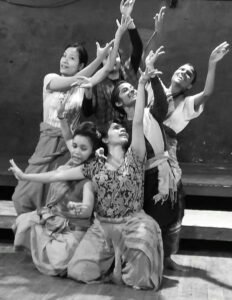Read in : தமிழ்
February saw the passing away of an important figure in modern Indian drama, KS Rajendran. Among the most famous dramatists in India and the world, Rajendran was born in 1952.
Rajendran was not only widely respected in Indian drama but also a highly impactful writer and director. Professor Rajendran was an expert in improvisational theatre in which on the spot improvisations happen as per the situation in the theatre arena. In improv theatre, the situation, the audience and the context are as much important as the story and the script itself. Rajendran was a master of this innovative genre. He spoke widely and taught widely including at the National School of Drama in New Delhi.
There is much that is already out there about him. Just a google search would pull out plenty of details. YouTube videos bring him out even more vividly. But there is one element that binds him with many creative artistes. Tamil Nadu has a tradition of not owning some of its brightest minds. Rajendran was among the most important of such talents.
His creative output at the National School of Drama is remarkable. It makes us proud too that here was a Tamil who touched such creative heights in contemporary theatre.
In the 1970s, while working at the Secretariat, he gathered his friends at his workplace and staged street plays. Directly trained by Badal Sircar, he established a group dedicated to theatre called Parivarthana. Many who attended Badar Sircar’s workshop conducted at the Cholamandalam Artists Village in the 1970s went on to become trailblazers. Journalist and playwright Gnani, writer Prabanjan and Poomani were among them. Poomani was part of KS Rajendran’s Parivarthana.
Rajendran did research on the topic of Dravidian movement and theatre supported by a fellowship by the Tamil Nadu government’s historical research department. The Dravidian movement unfortunately could never leverage the scholarship and talent he brought.
His creative output at the National School of Drama is remarkable. It makes us proud too that here was a Tamil who touched such creative heights in contemporary theatre. The plays KS Rajendran staged written by Tamil writers such as Indira Parthasarathy, Ambai and Sivaprakash made him famous in New Delhi. It can only be said that what was Tamil Nadu’s loss was New Delhi’s gain.

Karunaprasad, a dramatist who was active in Koothupattarai and runs a publishing house called Bodhivanam, says it is not easy for a Tamil to go to New Delhi and fly high in theatre. “Rajendran’s unique talents, teaching methods and his dramatization of works helped him to establish himself there,” he adds.
KS Rajendran was asked if he was happy with what he had achieved. He said he was but expressed sadness that he had not given anything to the people of Tamil Nadu.
KS Rajendran was asked if he was happy with what he had achieved. He said he was but expressed sadness that he had not given anything to the people of Tamil Nadu. That was a lack, he added.
It’s not that Rajendran was completely absent in the scene here. He taught a workshop at the Nandanam Arts College. Then he joined hands with Koothupattarai to stage Na Muthusamy’s play, Kattiakaran. With the support of Max Mueller Bhavan, he coordinated the staging of Bertolt Brecht’s play, Caucasian Chalk Circle.
Rajendran had mastered Natya Sastra. He held the opinion that dance and music were intrinsic to theatre. Perhaps his learning and mastery of Urdu, Sanskrit and Hindi to stage plays written in those languages were Tamil’s loss.
In a Facebook post of his, he has recalled the words of Harendranath Chattopadhyaya that the doctor’s fees are heavy, so are the lawyer’s fees. But an actor’s duty is to entertain and die. It was perhaps indicative of his commitment to theatre that continued till the very end. When talking of theatre, few can ignore the works of KS Rajendran.
Read in : தமிழ்











